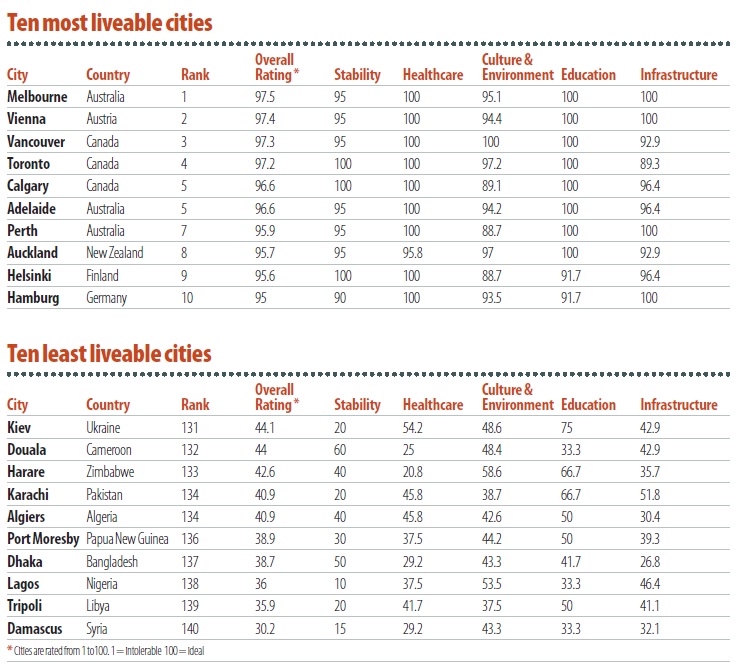The latest findings of The Economist Intelligence Unit's Global Liveability Ranking – which provides scores for lifestyle challenges in 140 cities worldwide – show that although Melbourne has retained its crown as the world's most liveable city, liveability has deteriorated in 29 of the 140 cities (20 per cent) surveyed over the last 12 months.

The decline is largely a result of heightened fears over terrorism with more than 1,000 reported attacks in 2016 so far, with incidents in France, Turkey, the US and Belgium being the most high- profile. Factors such as social unrest in many US cities due to the deaths of black people in police custody, tensions in Eastern Europe and Asia and the ongoing civil wars in Ukraine, Syria and Libya have compounded the decline.
Jon Copestake, editor of the report said, "The latest rankings paint a very somber picture. The global trend for declining liveability has become depressingly familiar in recent years as acts of terror in major cities are becoming an increasingly common occurrence. But even discounting terrorism, we are seeing greater instability around the world including unrest in the US, political disruption in Turkey and Thailand and geopolitical disputes in Eastern Europe and Asia."
Ten cities (Zurich, Geneva, Frankfurt, Berlin, Oslo, Luxembourg, Brussels, Paris, Rome and Lisbon) in Western Europe have seen declines in liveability, mostly stemming from heightened fears of terrorism in the wake of attacks in Paris and Brussels. While social unrest and regular cases of mass shootings have led to declines in the scores of five leading American cities (Chicago, Atlanta, Cleveland, San Francisco and New York), Cleveland and Atlanta both saw the steepest ranking decline, falling nine and 14 places respectively.
The findings show that even Australia, which is home to many of the world's most liveable cities, has not been immune to this experience. A hostage-taking incident in Sydney in 2014 has raised concerns about the threat of terror there, pushing the Australian city out of the ten most liveable. Heightened tensions in the South China Sea have also lowered scores for Chinese cities. The steepest score declines came from Tripoli in Libya, which crumbled 4.1% and Lagos in Nigeria dropping 3.7%.
Only six cities have managed to buck the trend, with improving liveability, although of these only Tehran has seen a noteworthy change. The Iranian capital has benefitted from the thawing of international relations, moving four places up the ranking and out of the very bottom tier of liveability.
The table gives an overall rating of 0-100, where 1 is intolerable and 100 is ideal.

About the Liveability survey
The concept of liveability is simple: it assesses which locations around the world provide the best or the worst living conditions. Assessing liveability has a broad range of uses, from benchmarking perceptions of development levels to assigning a hardship allowance as part of expatriate relocation packages.